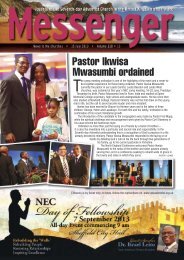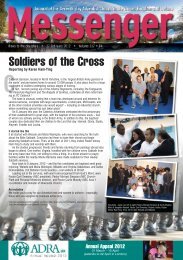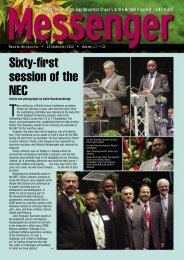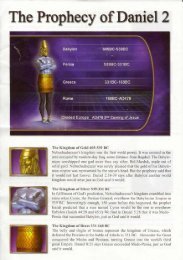Newbold College Awards Ceremony 2013 - Seventh-day Adventist ...
Newbold College Awards Ceremony 2013 - Seventh-day Adventist ...
Newbold College Awards Ceremony 2013 - Seventh-day Adventist ...
You also want an ePaper? Increase the reach of your titles
YUMPU automatically turns print PDFs into web optimized ePapers that Google loves.
4devotionalinbox5Are you aCheshire cat?by Pastor Solon KyriacouProverbs 14:13 (NKJV) reads like this:‘Even in laughter the heart maysorrow, And the end of mirth may begrief.’ For most of us, laughter andsorrow are mutually exclusive concepts. Likeoil and water, they cannot mix. We generallyfeel the same about worship – it is associatedwith a joyful heart and ‘making a joyful noise’– not with sadness or sorrow. After all, if wethink ‘worship’, then these words springto mind, don’t they: ‘praise’, ‘rejoicing’,‘happiness’, and ‘lightness of spirit’ – and weimagine smiling, beaming faces.Is it true, then, that you cannot worshipGod unless you are doing your bestimpersonation of a Cheshire cat? Perhapsthe following examples will provide ananswer.AbrahamIn Genesis 22 Abraham receives these curtinstructions from God: ‘Take now your son,your only son [the only heir to the promise Imade you] Isaac, whom you love, and go tothe land of Moriah, and offer him there as aburnt offering on one of the mountains ofwhich I shall tell you.’ (Vs. 2, NKJV.)Contrary to our expectations, Abrahamshows no sign of doubt, resistance,objection or even the slightest hesitation.He rises early the next morning, so as not towake Sarah and have to explain his dreadfulmission to her. She might well have hadsomething to say about the idea!Then Abraham sets off on the 50-milejourney from Beersheba to Moriah – the siteof the future temple in which countless othersacrifices would be made, and but a shortdistance from what would be known asGolgotha, where the ultimate sacrifice wouldbe made some 1,900 years later. There seemsto be no emotional upheaval – everything’sreported very matter-of-factly.In Genesis 22:5, with the mountain in view,Abraham tells the accompanying servants:‘Stay here with the donkey; the boy and I willgo over there, and the boy and I will worship,and the boy and I will come back to you.’That’s the emphasis of the Hebrew. There’s nodoubt in Abraham’s mind that even if he hasto go through with the gruesome task ofcutting his son’s throat and dismembering himfor a burnt offering, God will restore Isaac tohim (Hebrews 11:17-19).But even with such faith, do you think thatAbraham was going to the top of Moriahwhistling a jaunty tune and telling his son,‘God is good and it’s good to be alive – bythe way, make the most of it . . .’?Isaac, carrying the very wood his body issupposed to be laid on, innocently asks, ‘Myfather – behold, the fire and the wood, butwhere is the lamb for a burnt offering?’ andAbraham’s reply could only be, ‘God willprovide for Himself the lamb for a burntoffering, my son.’So there they were, on top of the mountain.Do you think Abraham was smiling while hebuilt the altar and prepared to worship? WasIsaac? I don’t think so.But Abraham was filled with faith, trust,hope in God’s resurrection power and anobedient spirit. The basis of his worship ofGod wasn’t his circumstance or how he wasfeeling at the time.JobAnd what about Job? You know the story –Job 1 is packed with a series of devastatingcalamities that rip through his life: his oxenand donkeys are stolen and the attendantservants murdered by marauders; acatastrophe from the skies destroys hissheep and the employees looking after them;then his camels are raided by anotherbunch of organised criminals and moreof his servants are killed in the process.As if that wasn’t enough, Job’sgiven just enough time to draw breathbefore another natural disaster wipesout all of his children, and more of hisservants, in one fell swoop.What happens next? ‘Job arose andtore his robe and shaved his head andfell on the ground and . . .’ what? Doeshe scream at God in incoherent fury,grief and despair? Does heabandon his faith because of hiscircumstances?No, Scripture simply says he‘worshipped’, using these words (1:21,NKJV): ‘Naked I came frommy mother’s womb, And naked shall Ireturn there. The LORD gave, and theLORD has taken away; Blessed be thename of the LORD.’Did Job worship with a happy,happy heart, with a joyful noise inhis mouth? I don’t think so. But heworshipped.David2 Samuel 11 easily rivals to<strong>day</strong>’s scandalswith its story of adultery, deceit and murder atthe highest levels of government. The kingis eventually confronted with his sin andconfesses it (2 Samuel 12), but no one cantell me that it hadn’t been on his mind sincehe first glimpsed the bathing beauty. InPsalm 51 he tells us that he knows histransgressions, and that his sin is ever beforehim. Of course he felt bad – he’d succumbedto lust, committed adultery, lied and schemedto cover his tracks, and, when that hadn’tworked, engineered the death of a loyal andcommitted warrior.And now comes God’s judgement. You’llalways have trouble in your home. You’ll be onthe receiving end of marital infidelity – and it’llbe public knowledge. And the real shocker:‘The child who is born to you shall die.’ Aninnocent life will be taken in your place!He pleads for that innocent life for a week,but the child dies. ‘Then David arose from theearth’ – the place where he had humbledhimself – ‘and washed, and anointed himself,and changed his apparel, and came into thehouse of the LORD and worshipped.’ (Vs. 20,KJV.)Did he dance before the Lord that <strong>day</strong>? Didhe make a joyful noise with his harp, trumpet,or lute, or punch out an up-tempo rhythm withhis tambourine? I don’t think so. But heworshipped.His courtiers couldn’t understand it, butDavid understood the relationship he hadwith his God, and he trusted Him. He tookresponsibility for his actions and he acceptedthe consequences. Did he worship with aheavy heart? Oh yes. But that worship alsoopened him up to the ministry of God’s Spiritso that he could bear those consequences andhelp Bathsheba do the same.You can worship God, even when yourheart is breaking. I counted that in all thepsalms addressed to God, only fifteen weresimply expressions of praise. Almost twice asmany were psalms of protest or pain, callingYou can worshipGod, even when yourheart is breaking.on God to deliver, and three timesas many incorporated both painand praise. David more often concludedhis psalms with praiseafter expressing his anguish, thanjust writing psalms that were exuberantpraise throughout. Theseare some of those familiar expressionsof anguish: ‘My God, whyhave you forsaken me?’ ‘Lord, I’msurrounded by evildoers.’ ‘OhGod, help me – my sin is destroyingmy soul.’ But note this – Davidoften concludes his crying out toGod with the calm, assured tonesof praise in spite of his situation.I noted a paragraph out of thisquarter’s lesson on Jonah thathighlighted how the Israelitesoften wrestled with God inanguish. It says this:‘Though Christians to<strong>day</strong>generally prefer the praise psalms,many of the 150 psalms are filledwith pain and protest. And recallthat these were sung by theIsraelites even in worship. Theintensity of the relationship withGod in the Old Testament seemsirreverent to some now. But,perhaps, it is more a matter of ourown immaturity in our relationshipwith God. God does not chidehurting believers. In fact, Healways shows amazing respectwith all such expressions . . . Godapparently values honesty in ourrelationship with Him. We do nothave to deny reality when prayingreverently to God.’Worship doesn’t just arise outof happy, carefree, light-heartedpeople. Weeping endures for atime. Joy follows – once we’veconsidered the reasons for ourweeping; once we’ve realised howfar from God we’ve strayed; oncewe’ve understood in our body,mind and spirit that God alwayshas been, is right now, and alwayswill be our Creator, Sustainer,Redeemer and Restorer – regardlessof our circumstances. It’s thepeace and assurance that Godgives us because of who He is,even more than what He’s done,that draws us to worship Him.Brothers and sisters, it’s notgood to have a habitually longface, but you don’t need to be aCheshire cat either. Don’t despisethe heavy heart. The three men wehave heard about had one thing incommon that enabled themto worship in spite of theircircumstances. They knew theirGod. Even under the burden oftheir heavy hearts, they werebrought out of their darkness and,when the storm had passed, theyhad all the more reason, and allthe more resources, to worshipGod.Extreme <strong>Adventist</strong>sDear EditorI was very interested to read‘Faith in fatigues’ (MESSENGER, 8February) about an <strong>Adventist</strong> whois also a soldier, especially as themain picture showed him with agun. The army has rules for peoplelike <strong>Adventist</strong>s to enable them tohave Sabbath off, but nowhere inthe story was there any mentionabout an important commandment:‘Thou shalt not kill.’ Justwhat does this man do when in asituation where it is ‘kill or bekilled’? I am disappointed that thiswas not discussed at all, and whatwould this soldier do should he beplaced in that situation? NICKY BELLRe: DressDear Editor1. The impact Diamond Sathe’sletter (MESSENGER 10 May) isintended to have on the youngladies of the church is that theywould realise that the church isa place of reverence – not anightclub or a beach – and dressaccordingly. God accepts everyone‘just as they are’ in their hearts,for them to change, not for Godto change with the times.2. Dr Shaw asks (MESSENGER7 June): ‘What defines modestclothing – a burkha, or perhaps acatsuit?’ Till recent years not manypeople were confused about themeaning of ‘modest’. Unless thisissue is brought to the fore andaddressed, I suspect that in theyears to come many more willbe asking the same question.According to the OxfordDictionary, 1 ‘modest’ means ‘(ofa woman) dressing or behavingso as to avoid impropriety orindecency, especially to avoidattracting sexual attention; (ofclothing) not revealing oremphasising a person’s figure.’Some will attend church only onthe following conditions: that theybe allowed to dress as skimpily asthey want, chew gum in church,play games and check footballscores on their phones in church(yes, I have seen this happen).Many fear that enormousdamage may be done to the youngif these things are pointed out tothem, for fear of them becoming‘casualties’.I would rather that issues arediscussed with them in kindnessfor reproof and correction, thanthat the church be held to ransom.DR BOBBY RAJAN1oxforddictionaries.com/definition/english/modestViews expressed in the Inbox do not necessarilyrepresent the opinions of the editorial staff or the BUC.Ever had questions about our faith, doctrines orpractice that you want to see resolved? Each weekI’ll be hosting Q&A in an effort to answer them.Andrew Puckering‘Who are the “sons of God” of Genesis 6:1-4?’A QGenesis 6:2, 4 (NKJV) says that ‘ . . . the sons ofGod saw the daughters of men, that they werebeautiful; and they took wives for themselves ofall whom they chose. . . . There were giants onthe earth in those <strong>day</strong>s, and also afterwards,when the sons of God came in to the daughters ofmen and they bore children to them. Those were themighty men who were of old, men of renown.’ Could the ‘sons of God’mentioned here be angels, and the ‘giants’ of great ‘renown’ their half-angel,half-human progeny?While it seems incredible, the Good News Bible (a modern paraphrase)supports the notion by translating ‘sons of God’ as ‘heavenly beings’. Since‘sons of God’ seems to refer to angels in Job 1:6; 2:1, 1 some may concludethat they are the same in Genesis 6. However, the ‘giants’ (Hebrew: nephilim)also appear during the Exodus (Numbers 13:31-33): so if the nephilimresulted from a union of ‘heavenly beings’ and ‘human women’, they didso after the Flood as well, an event of which the Bible gives no record.The <strong>Seventh</strong>-<strong>day</strong> <strong>Adventist</strong> Bible Commentary says plainly: ‘AncientJewish commentators, the early church fathers, and many modernexpositors have thought these “sons” to be angels. . . . This view must berejected, because punishment soon to be meted out was for the sins ofhuman beings (see vs. 3) and not of angels. Further, angels do not marry(Matt. 22:30). The “sons of God” were none other than the descendants ofSeth, and the “daughters of men”, [those] of the godless Cainites.’ 2Speaking of this, Ellen White commented: ‘The children of Seth, attractedby the beauty of the daughters of Cain’s descendants, displeased the Lord byintermarrying with them. Many of the worshippers of God were beguiled intosin . . . they “became vain in their imaginations, and their foolish heart wasdarkened”. Romans 1:21. Therefore “God gave them over to a mind void ofjudgment”. Verse 28, margin.’ 3How do we reconcile this description with that of ‘mighty men of old, menof renown’? ‘Since in those <strong>day</strong>s the entire human race was of great stature. . . the antediluvians generally possessed great physical and mental strength.These individuals, renowned for wisdom and skill, persistently devoted[these traits] to the gratification of their own pride and passions and to theoppression of their fellow men.’ 4 As another modern paraphrase puts it:‘In those <strong>day</strong>s people were giants, twice as large as people to<strong>day</strong>. Evenafterward, when children from mixed marriages of the godly with the ungodlywere born, they were mighty men. . . .’ 5Since we were created ‘very good’, in the image of God (Genesis 1:27,31), humans have been becoming less endowed, not more: a fact borneout by our shrinking lifespan (Genesis 5; 11). Ellen White writes ofamalgamation, not of humans and angels, but of humans and beasts. 6The ‘sons of God’ referred to in Genesis 6:1-4 were therefore probably notangels, but men.1<strong>Seventh</strong>-<strong>day</strong> <strong>Adventist</strong> Bible Commentary, vol. 3, p. 500; see also Ellen White’s The GreatControversy, p. 518 2 <strong>Seventh</strong>-<strong>day</strong> <strong>Adventist</strong> Bible Commentary, vol. 1, p. 250; see alsoNumbers 25 for a similar event in the Exodus 3 Ellen G. White, Patriarchs and Prophets, pp.81, 82 4 <strong>Seventh</strong>-<strong>day</strong> <strong>Adventist</strong> Bible Commentary, vol. 1, p. 251 5 Genesis 6:4 in the ClearWord paraphrase by Jack J. Blanco, my italics 6 Ellen White, Spiritual Gifts, vol. 3, pp. 64, 75Do you have a question you’d like to see answered in Q & A? Why not send itin to us at: editor@stanboroughpress.org.uk? If your question doesn’t appearin the next issue, don’t despair – we will deal with it in due course.






